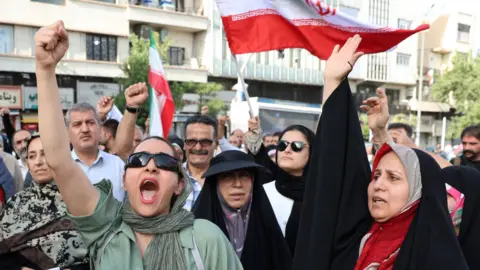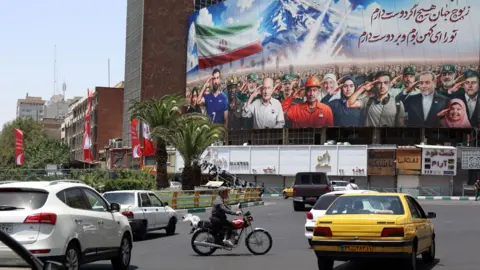BBC Persian
 EPA
EPA“My days and nights are the same. I feel paralyzed. I just stare on the ceiling all day and throughout the night.”
“I still wonder what will happen next, and we are constantly surprised.”
Shahla – who changed her name for its protection – is among the Iranians who called BBC Persian to express their fear and anger after the United States bombed three of their main nuclear sites in their country overnight.
US President Donald Trump said that the facilities of the Azfan, Natanz and Fordo were “blurring” and told Iran’s leaders that they now have the option of “peace or tragedy”.
But Iranian Foreign Minister Abbas Aragchi said that the United States had crossed a “big red line” and warned that it would be “permanent consequences.”
The strikes occurred slightly more than a week after Israel launched a large -scale air campaign against Iran, saying that it aims to remove what it described as existential threats of nuclear and ballet missile programs in the country.
The Iranian Ministry of Health says at least 430 people have been killed so far, although the Human Rights Group has been the death of this.
Iran has responded by firing rockets in Israeli cities, killing 24 people, according to the Israeli authorities.
The Iranian government has restricted its arrival to the Internet over the past week, which limits the flow of information about what is happening on the ground and made it difficult for families to communicate.
However, Miri – her real name was also not able to send a Persian BBC voice message that says how angry and angry American strikes left her.
“I don’t think I felt this level of sadness and anger at anything in my life,” she said. “But somehow, it also gives me a strange feeling – it reminds me that I am associated with something that goes beyond myself.”
“This war – the Iran war – is basically a conflict between three individuals. Three leaders, from three countries, driven by their own ideologies,” added, in reference to Trump, apparently, Israeli Prime Minister Benjamin Netanyahu and the supreme leader of Iran Ayatollah Ali Khameneini.
“I feel angry when I hear them mention names like Isfahan or suddenly declared:” We have dominated the sky of Iran. “These are not just words for me – they are sacred.”
Humayon, a man from the northwestern region of Mako, was defying in the face of Trump’s warning that Iran would face more attacks if they did not agree on peace.
“Yes, we are going through difficult times – but we will stand next to our country until the end. If necessary, we will present our lives to our country, to our honor.” “We will not allow America and Lackeys with any wrong moves in our country.”
Trump warned Iran on Saturday that any revenge against the United States “will meet much more strongly than tonight.”
But at a press conference in Türkiye on Sunday, Aragici announced that Iran has retained “all options to defend its security, interests and people.” He also said that the United States assumed “full responsibility for the consequences of its actions.”
We described the IRGC Corps Corps in the Middle East as “weaknesses, not the strengths.”
Before Israel launched its air campaign, the Iranian Defense Minister threatened to target all American bases “within our reach” if the United States participates in any strikes in its nuclear program.
Some militants also called for the targeting of US naval ships in the Gulf and the closure of the Strait of Hormuz, one of the most important shipping methods in the world.
 EPA
EPAAnother Iranian BBC Persian man told that he hoped this “the peak of the war escalation – and from here, things will begin to cancel the escalation.”
“Iran is rational enough to know that any response targeting the United States will be completely suicide,” he said.
“My child will be born in a few days, and I hope that his birth coincides with the birth of the new Iran – which adopts a new approach to both the international regime and its local affairs.”
He added: “I hope that they will grow up, knowing that surveillance cameras and security forces should focus on real threats, not to enforce the veil,” referring to Iran’s strict laws that require women to wear the veil that led to the fighting protests of the deadly government in 2022.
Another person was criticizing the cost of Iranian nuclear aspirations.
They wrote: “Fordo and Natanz, and the Iranian nuclear program in general, were tears in my eyes and the blood of your hearts. They cut the episodes in the country for years, and they increased the nuclear budget to build these facilities.”
Farhad – not his real name: “I am not happy with what happened, but the previous approach to the Islamic Republic was not loaded. I hope he would wait for a good future Iran.”
At a crossing on Iran’s borders with Armenia, a young woman who fled from Tehran with her family at the same time told the BBC that she does not support the change of the regime imposed by foreign powers in Iran.
“We were trying to make changes inside, and I don’t think the change coming from us or Israel would be a good change,” she said.
https://ichef.bbci.co.uk/news/1024/branded_news/5139/live/a15067c0-5012-11f0-a466-d54f65b60deb.jpg
2025-06-22 16:25:00














